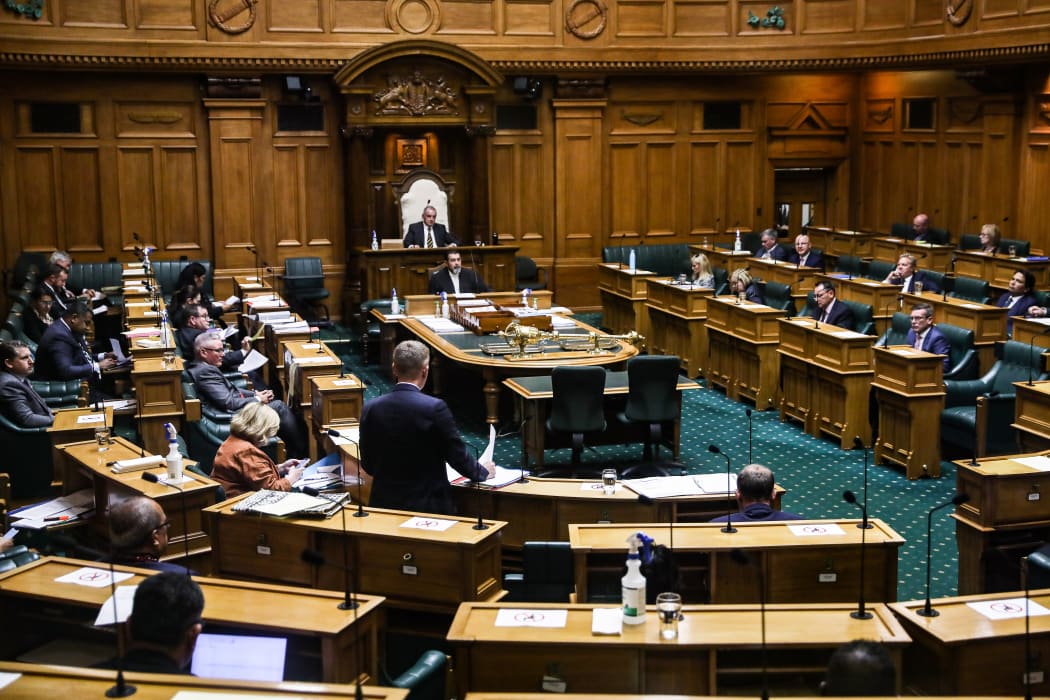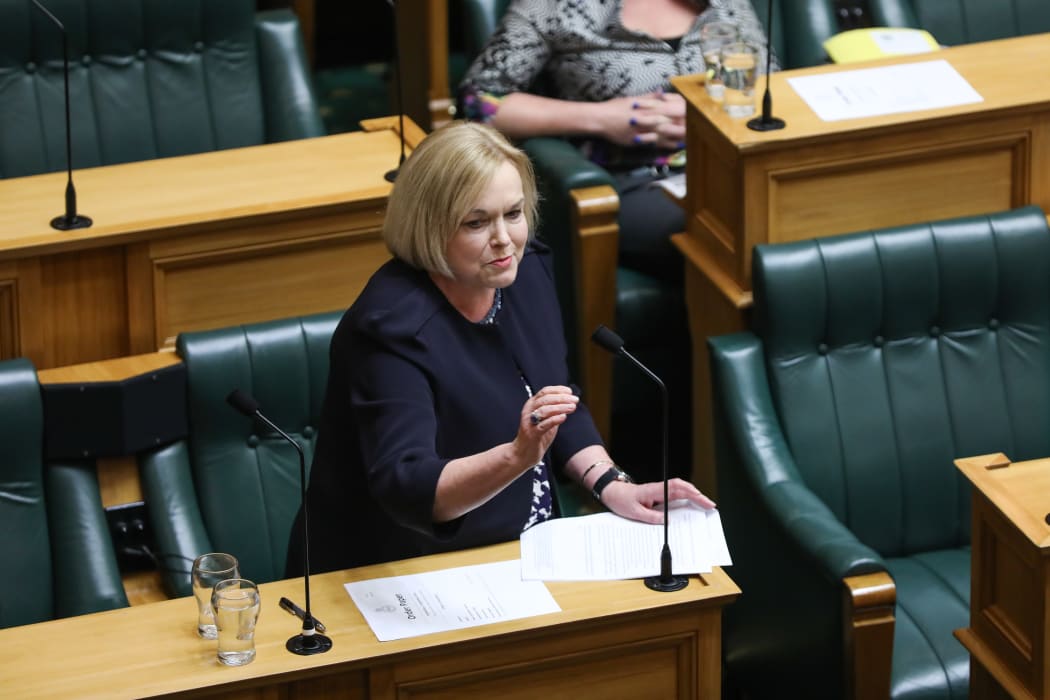Shorter days, fewer MPs, and work on Covid-19 are a few of the changes at Parliament as it sits under Covid alert level 2 this week.
The Government announced Auckland would move to alert level three and the rest of the country to alert level 2 following three cases of community transmission were identified in South Auckland on Sunday.
Parliament will continue to meet in Wellington under alert level two but with some changes.

Minister for Covid-19 Response Chris Hipkins addresses a spaced out House sitting under Covid alert level 2 Photo: ©VNP Phil Smith
Fewer MPs in the House
Alert level two means reduced numbers of MPs in the House of Representatives in Wellington.
The Leader of the House Chris Hipkins is in charge of organising what MPs will work on in the debating chamber and said the focus will be more on essential business only.
“We won’t be looking at progressing particularly controversial legislation bearing in mind that Members of Parliament who are in Auckland are by and large staying in Auckland. They’re staying at home the same as we’re asking everyone else in Auckland to do,” said Hipkins.
Select committees, which are smaller groups of MPs tasked with looking more closely at legislation and hearing from members of the public, will still meet via Zoom.
Physical distancing is required in the chamber so the number of MPs for each party has been reduced and will be allocated in proportion to their caucus size.
Hipkins said ministers who are required to answer questions and Wellington based MPs from the Labour party will be at Parliament but they won’t be bringing in MPs from all around the country.
“We’re saying stay home in your communities, support your communities as they need to be supported rather than come to Wellington,” Hipkins said.
The House of Representatives sits from 2pm-10pm on Tuesdays and Wednesdays, and from 2pm-5pm on Thursdays on scheduled weeks but this week will finish up as soon as it’s done with the business set out for each day.
Scrutiny

Leader of the Opposition Judith Collins. Part of the Opposition's role is to hold the Government to account by questioning its actions and proposals. Photo: VNP / Daniela Maoate-Cox
Question time will take place each day with Covid-19 likely to dominate the hour of up to 12 questions addressed to Ministers.
“We need to make sure that we have the opportunity for scrutiny so we will have question time each day so members of the opposition in particular can still ask questions of the Government,” said Hipkins.
The general debate will also take place after question time on Wednesday. Most debates in the House are specific to the subject of a bill and parties are given speaking slots based on the number of MPs they have.
The general debate allows for MPs to talk about any topic they wish and Hipkins said it gives MPs an opportunity to speak their minds.
“What we saw during the last lockdown was that we had an opportunity for MPs to talk specifically about the Covid-19 response and share their views on that,” he said.
The speeches delivered during the general debate can give members of the public a better understanding of where parties and MPs sit on the current issues Parliament is dealing with, said Hipkins.
“What are the concerns they’re raising with the Government [and] what’s the Government’s response to those concerns?” he gave as examples.
Covid-19 and Māori wards bills
Some legislation will be worked on this week and the Government is putting forward a bill on Tuesday to set up a Resurgence Support Payment for businesses affected by the re-emergence of Covid-19.
Firms that experience a 30 percent drop in revenue over a seven-day period will be eligible. The payment would include a core per business rate of $1500 plus $400 per employee up to a total of 50 FTEs ($21,500)
The Minister of Finance Grant Robertson who said the “payment recognises that some businesses face one-off costs or impacts to cashflow when we step up an Alert Level to follow public health advice.”
The bill will be worked on under urgency which means it can be passed through all its stages consecutively (a process which can usually take months) but a decision on whether it will come into effect will only be made if the alert levels are extended said Robertson.
Urgency may also be moved on Thursday for the remaining stages of the Local Electoral (Māori Wards and Māori Constituencies) Amendment Bill
The bill will mean local councils will no longer be bound by poll results when deciding to establish Māori wards or constituencies - the provision does not apply to general wards or constituencies and councils can still hold polls to gauge public opinion.
The bill has to be passed soon for it to take effect on the local government elections scheduled for 2022. It has gone through a speedier process than usual with its introduction and first reading taking place last Tuesday and a quick turn-around by the Māori Affairs Select Committee which reported back to the House yesterday.
-
Māori wards: A voice on local council grounded in the Māori world view
-
Bridges leads National's angry response to Māori wards legislation
See how far the House of Representatives gets each day here and stay up to date with the latest Covid-19 news here.


